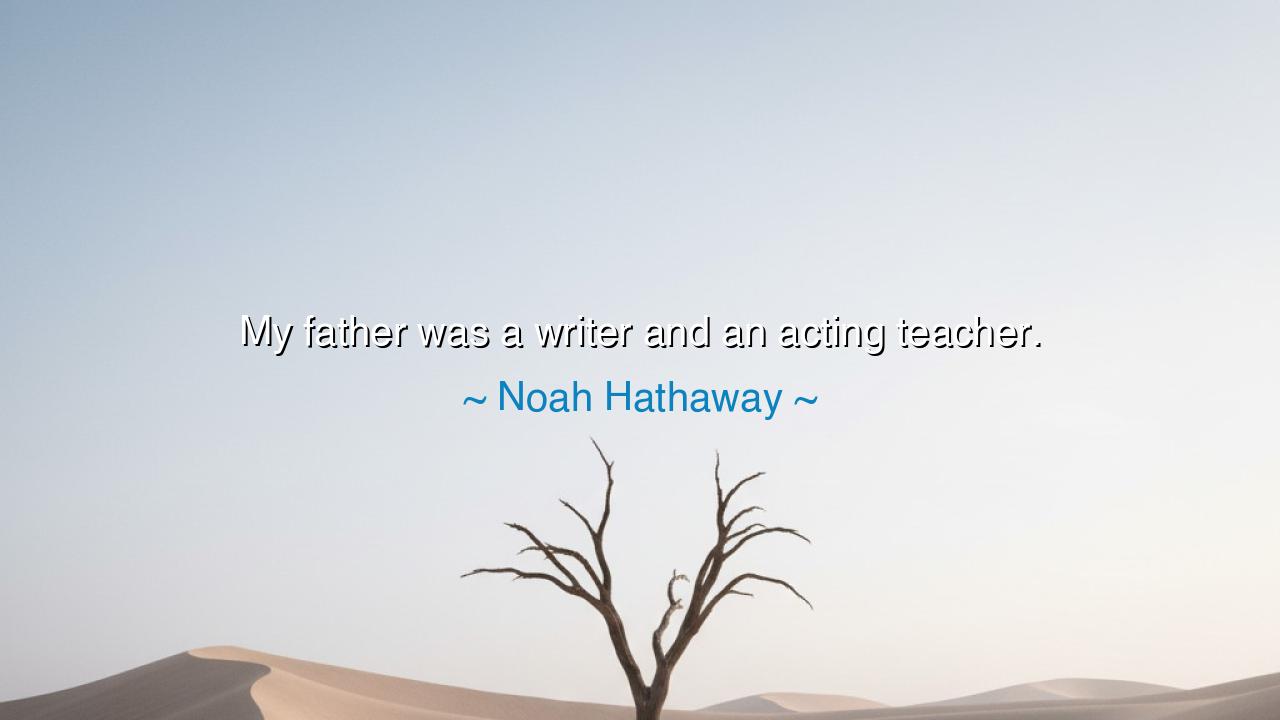
My father was a writer and an acting teacher.






In the words of Noah Hathaway, spoken with simplicity yet carrying the depth of heritage, we hear: “My father was a writer and an acting teacher.” At first glance, these words may appear as mere recollection, but within them lies a profound truth about the shaping of destiny. For the father is both root and guide, planting seeds of imagination and discipline in the child, and through his example, handing down not only livelihood but vision. To have a father who is both writer and teacher is to be raised within the twin realms of creation and instruction, where words give birth to worlds and where performance breathes life into them.
The writer is the dreamer of realities unseen, the one who crafts thought into word and word into immortality. The acting teacher is the cultivator of presence, the one who shows others how to inhabit characters and speak truths through the body and the voice. To be both is to unite mind and form, imagination and expression. Thus, Hathaway’s father was not merely a man of letters or of stagecraft, but a bridge between idea and performance. His influence would have been like a fire in the household: a flame that both illuminated and warmed, shaping Noah with the quiet force of example.
History gives us parallels to such inheritance. Consider Sophocles, whose dramas shaped the ancient Greek stage, but who himself was molded by a culture where art was passed down, preserved, and taught like a sacred trust. Or reflect on Johann Sebastian Bach, born into a family of musicians, who received from his forefathers not only the skill of music but also the understanding that art is both discipline and devotion. In each of these, as in Hathaway’s memory, the lineage of creativity and teaching becomes a legacy, handed like a torch from one generation to the next.
The meaning of Hathaway’s words also reminds us that the roles of parent and teacher are intertwined. The father who writes does not merely craft stories for himself; he teaches his child the value of expression. The father who trains actors does not merely show technique; he shows his child the discipline of practice, the humility of rehearsal, and the courage of stepping before others. The home becomes a classroom, the parent a guide, and the child, knowingly or not, a student of both art and life.
There is also a lesson here about the power of example. Children learn not only by instruction but by observation. A father who writes demonstrates the patience of creation, the struggle with words, the triumph of ideas made manifest. A father who teaches shows how to draw out greatness from others, how to listen, how to correct with wisdom, and how to inspire confidence. These are lessons no textbook can provide; they are carved into the soul by watching, by imitating, by living alongside a parent whose life is itself a teaching.
From this reflection emerges a call to all: to live as though our daily work is also a legacy. Whether we are parents, mentors, friends, or leaders, the way we labor and create becomes the unseen curriculum for those who follow us. If we create with integrity, they learn integrity. If we teach with patience, they learn patience. The inheritance of values is greater than the inheritance of wealth, and the true teacher is not the one who delivers lessons but the one whose life itself becomes the lesson.
In practice, then, let us strive to embody what we wish to pass on. For parents, this means living with courage and honesty, knowing your children watch. For teachers, it means remembering that your influence stretches beyond the classroom, shaping not only minds but hearts. And for all, it means treating daily work as sacred, for someone—known or unknown—will be shaped by the way you do it.
Thus, the words of Noah Hathaway, simple yet profound, stand as a reminder of heritage and responsibility: “My father was a writer and an acting teacher.” Let us see in this not only one man’s memory, but a universal truth—that each of us, in our work and in our teaching, becomes the silent author of another’s destiny. And in this recognition lies both the weight of duty and the glory of legacy.






AAdministratorAdministrator
Welcome, honored guests. Please leave a comment, we will respond soon